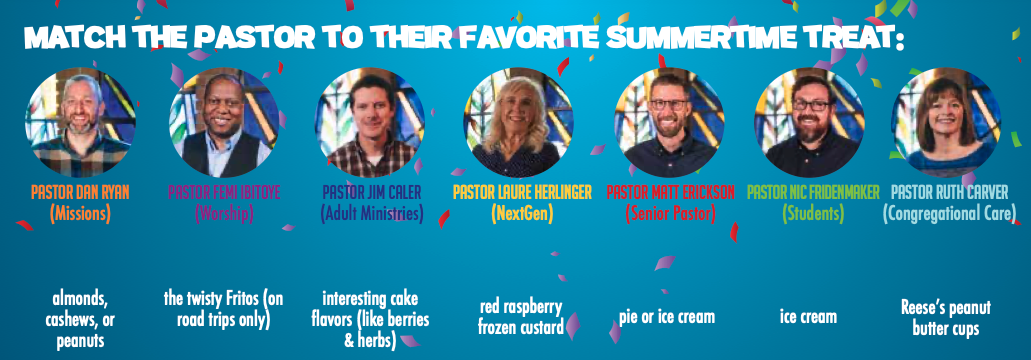by Jessica Eckert
Paul Sinclair has been coming to Eastbrook for almost nine years. During that time, he also served as our Missions pastor for two years before retiring in 2018. He and Lisa, his wife of 43 years, reside hours north of the Eastbrook campus, but make countless trips to the city to continue to be part of the church community, as well as to see their children and grandchildren.
Before worshiping alongside us here, Paul served as a pastor of another church in the Milwaukee area as well as a missionary in West Africa for ten years. He loves to serve God in tangible ways, but more recently, he discovered the beauty of spending time in God’s presence. Let’s help make our big church feel smaller as we get to know Paul, and learn how he sets the table to meet with God.
How is retirement treating you?
The word ‘retirement’ I’m not crazy about. It is a transition from full-time paid ministry to unpaid ministry, which for me has looked like spending hours with my grandkids and mentoring men in prisons across the state.
You’ve worked in a variety of ministry roles over the years. How were you originally introduced to God?
I grew up in Kentucky and my family went to a Southern Baptist church. At age nine I accepted Christ, but I never understood the grace of God. I [developed] a fear of God, that He would judge me. The fear quickly turned to shame that I carried with me as a teenager, 20-year-old, and into my thirties. I was doing a lot of service for God while the shame drove me to sinful habits that began to cripple my ministry. In my own dark night of the soul, Father God embraced me with compassionate arms. Understanding the grace of God was my turning point. God got a hold of me like this [mimics hands holding his shirt collar] and said, “Paul, you may act as though the world depends on your service, but you are not needed outside of your need to be with Me.”
How did you process needing to be with God in contrast to serving Him out of your own strength?
What I’ve wrestled with, because my personality is one of work and service, is that Christ calls us to serve Him, and be diligent, active, and passionate. God showed me that life apart from Him leads to death. I needed to be intentional in my time with Him.
How have you become more intentional with Him?
I have historically not been good at rest. However, rest is so essential to a person continuing to be able to breathe in God’s unlimited, unmerited love and grace. The idea of rest, for me [is like] I’m setting a table. When I sit down and take a meal, there’s a spoon, plate, and cup. Spiritual disciplines help me to set the table to connect with Jesus. I have the ability to hear Him and I can respond to Him.
What spiritual disciplines help you set the table to meet with God?
I practice the five “S’s:” Solitude, Silence, , Service, and Supplication.
What do these practices look like in your life?
I try to start the day with God. I read Scripture and pray because I desperately need the silence and solitude. Sometimes I put myself physically in a new space so that I’m not distracted by other things.
Years ago, a Christian psychologist encouraged me to work on a spiritual journal and to come up with a personal calling statement. It includes my purpose for living, core values, life vision, and the care of my physical body. I review it every week to make sure that the main thing remains the main thing and that I’m not getting into workaholic mode.
Can you say more about the discipline of secrecy?
In the past, I would use my service to seek man’s approval. I have people-pleaser tendencies that I have to actively fight. Practicing the spiritual discipline of secrecy propels me to seek the Savior’s okay only while doing things for and with God.
One service opportunity that really helped solidify this for me was frying chicken at a soup kitchen. Instead of being in front of the group preaching or something like that, I was behind-the-scenes preparing food for folks who hardly saw me. People were fed delicious food while I received nothing more than a shifted perspective, all glory to God. I was humbled.
I like to think of it this way: as I live my life out, with an audience of One, man’s affirmation must be secondary to His. Whatever actions that I do, do not need to be seen by others. They only have to be seen by God.
If you could give encouragement to someone beginning to incorporate spiritual disciplines into their life, what would you tell them?
When I started, I was really nervous. I thought, ‘what am I supposed to do?’ and quickly realized I needed to become comfortable with the uncomfortable. I’d say to start where you are and start small. You can make it a short piece of your time. Perhaps you open Scripture to meditate on it. You can read and be quiet, then you can ask God to speak and sit and wait. Make sure that you do not fill the space. God is present. He will speak.
I’d also say spiritual disciplines are not the goal. [They are tools] we can use on the journey to walk with God. We will always have a limp of some sort. The spiritual disciplines allow us to walk well with our limps. ■
ABOUT THE AUTHOR: Jessica Eckert is an early childhood nanny who has been an active member at Eastbrook since 2022, serving in the Food Pantry and behind-the-scenes with material preparation.
Recommended Posts

Summer Mixtapes
June 7, 2024

Pastors: They’re Just Like Us!
June 7, 2024

What’s in Your Bible?
June 7, 2024



